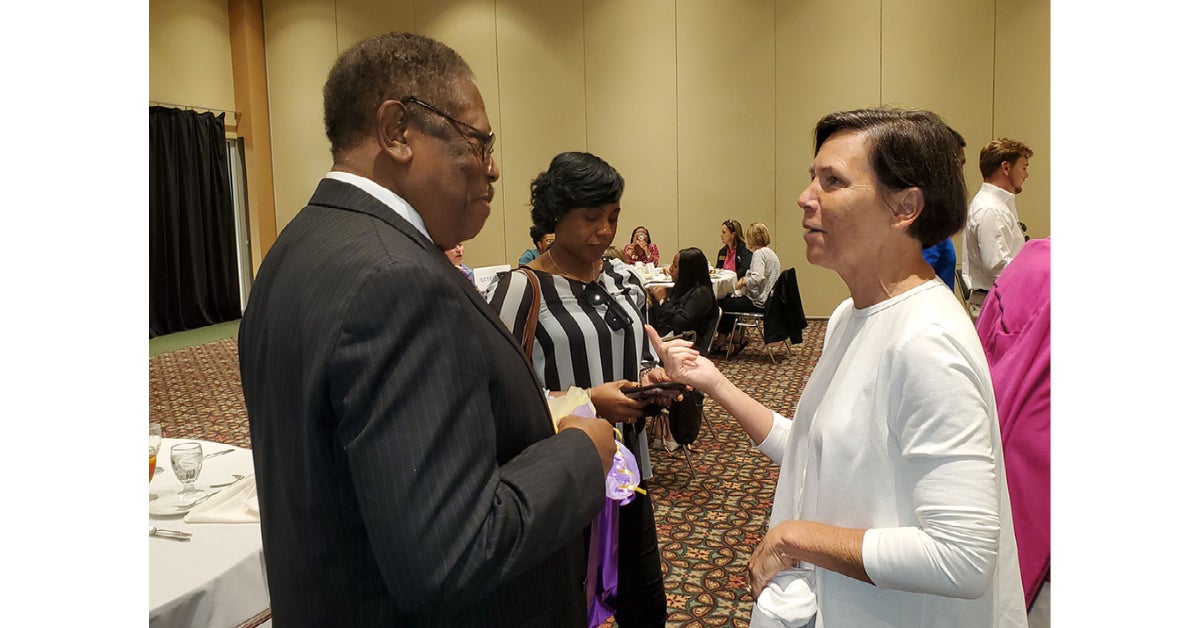Simmons: Roads west of Interstate 55 shorted money for infrastructure
Published 4:00 am Thursday, June 17, 2021

- Central District Transportation Commissioner Willie Simmons speaks with District 5 Supervisor Kelle Barfield following Simmons' presentation at the June Chamber of Commerce Luncheon on Wednesday. (Photo by John Surratt)
When it comes to spending state and federal money on infrastructure, the areas west of Interstate 55 in Mississippi have been short-changed, Central District Transportation Commissioner Willie Simmons said Wednesday.
Of the estimated $3.4 billion the state spent in the three-phase 1987 four-lane highways project, he said, the east side of I-55 received $2.84 billion as opposed to $528.1 million in the west. He wants to change that equation.
“We’re going to build the west side of the state of Mississippi like we built the east side,” Simmons said at the Vicksburg-Warren Chamber of Commerce monthly luncheon.
He said the state’s leaders and members of its congressional delegation should be told to “earmark this part of the state as a part of the state that needs to be fixed so we can be aggressive to find the jobs and to grow our ports and our industrial parks with safe, Class A highways.”
And Vicksburg and Warren County, Simmons said, are in very a unique location to benefit.
“When you think about where you are sitting on the Mississippi River with a great port, it means that you’re growing economically and that you have a need for infrastructure improvements. When we meet those and you grow in your industrial park and your port, it means jobs are going to be created and you’re going to be even better,” Simmons said.
He said Vicksburg’s location near Jackson and Continental Tire near Clinton “and all the things that you’re doing here means we must invest in you.”
Simmons recalled the first time he came to Vicksburg as transportation commissioner. The first thing local officials sought, he said, was $350 million.
One of the first projects for Vicksburg, he said, is improving the city’s Interstate 20 interchange system, which he called “one of the worst interchange systems in America because of the way they were laid out. When you look at the Clay Street ramp and others, you see the need for improvement.”
Simmons said after the lunch that changes to I-20 in Vicksburg are in design but said no target has been set because funding has not been approved for construction.
“It’s very costly for those things when you look at interchange systems and exits and talk about how to phase that in to make it work for the good of Vicksburg-Warren County and the growth you have,” he said.
“It’s on my radar. It has become a priority.”
However, Simmons said improvements can’t stop with better and safer interchanges and access ramps.
As the port and the Ceres Industrial Park grow, he said, “We get more traffic coming across the river and we see the eastbound movement (of traffic) is going to create an even bigger challenge to move traffic on I-20 in this area.
“It has already reached its capacity and as a result, you begin to see all the 18-wheelers and all the other traffic coming through; there is a congestion beginning to develop in the eastbound lanes.”
That, Simmons said, will force highway officials to begin looking at adding lanes to I-20 eastbound to Jackson.
“It’s very important that we do that so we have a complete and whole system working for you and our future needs and future growth to grow businesses.
“We’re talking about the interchanges, talking about access; we may be very close to looking at $700 to $800 million that needs to be invested in this area.
“We need more lanes going in (to Jackson),” he said.
Simmons said the state hasn’t had a significant infusion for infrastructure since 1987 when the Legislature approved building a highway system within 30 miles of every person living in Mississippi.
“(But) They didn’t put money in the system for maintenance or for capacity growing the highways,” he said.
Simmons said the state’s main source of money for infrastructure is the 18 cent per gallon fuel tax, which he said does not provide the necessary money for infrastructure maintenance. He urged chamber members to tell state legislators to increase the gas tax to provide the necessary funds.
He said the proposal by auto manufacturers to build more electric cars could eventually impact gas tax revenue.
If the fuel tax is not increased, he said, the state will have less and eventually no money for roads.
“That means your children and grandchildren will be driving electric cars on gravel roads because the roads will deteriorate,” he said. “We won’t have the dollars to maintain them.”
He urged members to call the state’s congressional delegation and tell them “We want a piece of the pie of the proposed federal infrastructure bill.”






